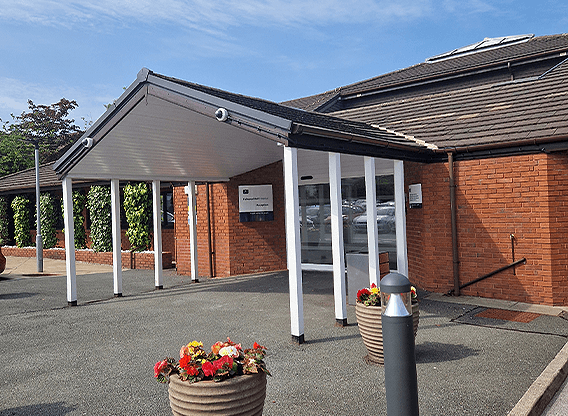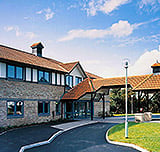Sciatica commonly occurs when one or more nerves in your lower back become irritated, inflamed, or compressed, often causing pain that travels down into your legs. While it can be uncomfortable and disruptive, sciatica is usually not serious, and most people recover with time, movement, and simple self-care. In more severe cases, medical treatment or even surgery may be needed.
On this page, you’ll learn how to recognise sciatica symptoms, what causes it, and the treatment options available - from gentle sciatica exercises to expert care. We’ll also explore the costs of treatment and what recovery looks like.
What is sciatica?
Sciatica isn’t a condition in itself - it’s a symptom. It refers to pain caused by irritation or compression of your sciatic nerve, which runs from your lower back down through your hips, buttocks, and legs. This pain can feel sharp, burning, or like an electric shock, and it usually affects one side of your body.
Sciatica is often the result of an underlying issue, such as a herniated disc, spinal stenosis (narrowing of the spine), or another problem that puts pressure on your sciatic nerve. While it can be uncomfortable, most cases improve with time and self-care. The sections below explore the symptoms, causes, and treatment options to help you understand and manage sciatica effectively.
How do you know if you have sciatica?
Sciatica often feels like a sharp, burning, or shooting pain that starts in your lower back and travels down through your buttock and into one leg. You might also notice tingling, numbness, or a pins-and-needles sensation in your leg or foot. In some cases, the affected leg may feel weak or harder to move.
If your pain follows this pattern, especially if it’s worse when sitting, coughing, or moving, it could be a sign of sciatica. Because sciatica symptoms vary in intensity and duration, it’s important to speak with a healthcare professional for a proper diagnosis and personalised advice.
What causes sciatica pain? Common causes and symptoms explained
Sciatica pain is usually caused by pressure or irritation affecting the sciatic nerve, which runs from your lower back down through your legs. This pressure often stems from an underlying condition that affects your spine or surrounding muscles.
One of the most common causes is a herniated disc, where the soft inner part of a spinal disc pushes out and presses on nearby nerves. Another frequent cause is spinal stenosis, a narrowing of the spinal canal that can compress nerve roots. In some cases, sciatica may result from piriformis syndrome, where a small muscle in your buttocks irritates the sciatic nerve as it passes underneath.
These conditions can lead to one-sided pain that radiates from your lower back into your buttock, leg, and sometimes your groin or knee. Understanding the cause is key to finding the right treatment and lasting relief.
What does sciatica feel like?
Sciatica symptoms often feel like a sharp, shooting pain that starts in your lower back and travels down through your buttock and into one leg. Some describe it as a burning or electric shock sensation, while others experience numbness, tingling, or a pins-and-needles feeling in the leg or foot.
The pain typically affects one side of your body and can range from mild and occasional to severe and constant. Some people experience intermittent flare-ups, while others live with a steady ache that interferes with daily activities.
How to relieve sciatica pain?
Sciatica pain can often be eased with simple strategies that reduce inflammation, relax muscles, and relieve pressure on your sciatic nerve. Below are methods aimed at giving immediate relief for sciatica pain, grouped into three key areas.
Sciatica relief exercises
Gentle movement is one of the most effective ways to reduce sciatic nerve pain. Lower back, hip, and leg stretches for sciatica can help relieve pressure on your nerve and improve flexibility.
- Nerve glides (or flossing) - these controlled movements help mobilise your sciatic nerve and reduce irritation.
- Piriformis stretches - target the small muscle in your buttocks that can compress your sciatic nerve.
- Lumbar rotation and extension stretches - help open up space around your spine and reduce nerve compression.
Regular sciatica exercises and stretching improves circulation, reduces stiffness, and supports long-term recovery.
Pain relief medications
Over-the-counter medications can help manage inflammation and provide sciatica pain relief:
- NSAIDs (e.g. ibuprofen or naproxen) reduce swelling around your nerve and ease pain.
- Paracetamol may help with mild discomfort, though it’s less effective for nerve-related pain.
- Topical analgesics like heat rubs or gels can provide localised relief.
Always follow dosage instructions and consult a pharmacist or GP if symptoms persist.
Home remedies
Simple home-based strategies can offer quick sciatica pain relief:
- Heat therapy - applying a warm pack to your lower back or buttock relaxes tight muscles and improves blood flow.
- Cold therapy - ice packs can reduce inflammation, especially in the first 48 to 72 hours of a flare-up.
- Gentle movement - avoid prolonged sitting or bed rest. Light activity helps prevent stiffness and supports healing.
These methods are most effective when used consistently and combined with professional advice.
How to treat sciatica
Long-term treatment for sciatica focuses on relieving pressure on your sciatic nerve and preventing future flare-ups. Most people respond well to non-invasive therapies, while more advanced options may be considered if symptoms persist. Professional guidance is key as sciatica treatment works best when tailored to your needs and supported by expert care.
Osteopathy
Osteopaths use hands-on techniques to improve spinal alignment, reduce muscle tension, and relieve nerve pressure. Osteopathic treatment may include gentle manipulation, stretching, and soft tissue work to support natural healing.
Physical therapy
Physiotherapy develops tailored sciatica pain relief exercise programs to strengthen core muscles, improve flexibility, and support spinal health. Regular movement helps reduce inflammation and prevent recurrence.
Pain management
Medications such as NSAIDs, muscle relaxants, or nerve pain treatments may be prescribed for pain management. In some cases, spinal injections can offer targeted relief.
Psychological support
Chronic pain can affect your mental wellbeing. Therapies like cognitive-behavioural therapy (CBT) help patients manage stress, improve coping strategies, and reduce the emotional impact of pain.
Surgical intervention
If conservative treatments don’t help or symptoms worsen, surgery may be recommended. Procedures like discectomy or spinal decompression aim to relieve nerve pressure and restore function.
How long does sciatica last?
The duration of sciatica can vary widely depending on the cause, severity, and how it's treated.
For many people, acute sciatica that is often triggered by a herniated disc or muscle strain resolves within 1 to 2 weeks. Most symptoms continue to improve over the following weeks or months with conservative care.
However, chronic sciatica can persist for months or even years, especially if the underlying issue isn’t addressed or if nerve irritation continues. In these cases, pain may come and go, or remain at a low level over time.
Factors that influence duration:
- Severity of nerve compression
- Underlying cause (e.g. disc herniation vs. spinal stenosis)
- Age and overall health
- Activity level and posture
- Timeliness and type of treatment.
Early intervention, such as physiotherapy, osteopathy, or pain management, can shorten recovery time and reduce the risk of recurrence. Chronic cases may require more structured care, including psychological support or surgical options, to manage symptoms long-term.
What are the costs of sciatica treatment?
The cost of sciatica treatment can vary depending on the type of care, whether it's accessed privately or through the NHS, and your insurance coverage. Below is a breakdown to help you understand what to expect.
Insurance coverage
If you have private medical insurance, many sciatica treatments including consultations, diagnostics, and procedures are often covered. It’s important to check with your provider to confirm what’s included and whether pre-authorisation is required.
Payment options
For those self-paying, here’s what to expect:
- Consultations - typically range from £150 to £350, depending on the specialist and location.
- Physiotherapy - sessions typically range from £40 to £140, with packages available for ongoing care.
- Diagnostic tests - imaging such as MRI scans typically cost anywhere between £200 to £1,500, depending on the hospital, location, the scan required, and how many body parts need to scanned. These are often billed separately.
Ramsay Health Care UK offers transparent pricing and flexible payment plans. Our TotalCare™ package offers an all-inclusive price covering pre-op assessments, diagnostics, consultant fees, hospital charges, and aftercare. We also offer interest-free and long-term financing options.
What is the recovery process after sciatica treatment?
Recovery from sciatica varies depending on the type of treatment and the severity of your condition. Most people begin to feel better within a few weeks, especially with non-invasive care like physiotherapy, osteopathy, or medication. For acute cases, symptoms often improve within 2 to 6 weeks, while chronic or more complex cases may take several months to resolve.
Non-surgical recovery
- Physical therapy and osteopathy - gradual improvement over 4 to 8 weeks, with increased mobility and reduced pain.
- Medications and lifestyle changes - relief may begin within days to weeks, but full recovery can take longer depending on consistency and underlying causes.
Surgical recovery
- Spinal injections - recovery is usually quick, with symptom relief in a few days to a couple of weeks.
- Surgery (e.g. discectomy or decompression) - initial healing takes 2 to 6 weeks, followed by 3 to 6 months of rehabilitation to restore strength and function.
Recovery is rarely linear. Some days may feel better than others. Signs of progress include reduced pain intensity, improved movement, and fewer flare-ups. Working closely with healthcare professionals ensures a tailored plan and realistic expectations for healing.
Sciatica at Ramsay Health Care
At Ramsay Health Care UK, patients experiencing sciatica benefit from expert, personalised care delivered by a multi-disciplinary team of specialists - including orthopaedic consultants, neurologists, physiotherapists, and osteopaths.
Ramsay’s approach combines advanced diagnostics, evidence-based treatments, and compassionate support to help patients manage pain and restore mobility.
Whether you’re dealing with acute flare-ups or long-term discomfort, Ramsay offers a full spectrum of care - from initial assessment and imaging to physiotherapy, spinal injections, and surgical options when needed.
Why choose Ramsay?
- Specialist-led care tailored to your needs
- Rapid access to diagnostics including MRI and X-ray
- Flexible payment methods - 0% payment plans, use your insurance
- Trusted expertise in spinal health and pain management
- Commitment to clinical excellence with accreditations from the Care Quality Commission (CQC), JAG, and the National Joint Registry.
Ready to take the next step?
You can book a consultation online or contact your local Ramsay hospital to arrange to speak with a specialist. Many locations offer fast-track appointments for added convenience.
Sciatica FAQs
Does sciatica go away?
Yes, in many cases sciatica improves with time, rest, and conservative treatments like physiotherapy. Most people recover within a few weeks, though some may need longer-term support or specialist care.
How to sleep with sciatica?
Try lying on your side with a pillow between your knees, or on your back with a pillow under your knees. A supportive mattress and gentle stretching before bed can also help reduce discomfort.
Does sciatica come and go?
It can. Sciatica symptoms may flare up intermittently, especially with certain movements or prolonged sitting. Managing triggers and staying active can reduce recurrence.















